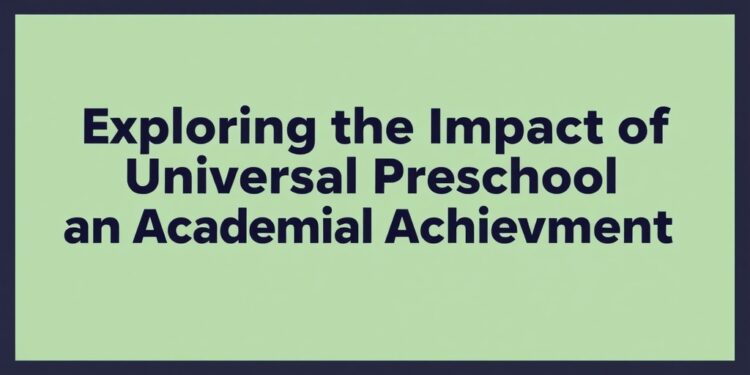Recent research highlights the critical role that state-funded pre-kindergarten programs, such as those in Georgia, play in shaping the educational outcomes for children. These programs are structured to provide early learning opportunities to students, irrespective of their family income. However, the longitudinal effectiveness of such programs is a subject of ongoing investigation. A new study published in the journal Economic Inquiry delves into whether these pre-kindergarten initiatives yield sustainable academic benefits throughout a child’s educational journey.
Utilizing data from an enrollment lottery within a sizable school district in metro Atlanta, researchers meticulously analyzed the academic performance of children who were awarded spots in pre-kindergarten classes through the lottery. The data indicates that children who secured their place in these school-based pre-kindergarten programs exhibited a significant head start when they transitioned into kindergarten. They demonstrated enhanced preparedness in both mathematics and reading compared to their peers who were not selected through the lottery system.
While these early advantages in academic preparedness are promising, the study reveals a concerning trend: the gains observed among pre-kindergarten participants appeared to diminish by the conclusion of the kindergarten year. Furthermore, subsequent assessments indicate that some negative effects on academic achievement may surface as early as the fourth grade. This raises profound questions about the enduring impacts of pre-kindergarten education and underscores the variability in educational trajectories among different populations of students.
A deeper analysis of the data shows that students who participated in the program and were also beneficiaries of free-and-reduced-price meals exhibited greater academic gains in grades one, two, and four. This suggests that disadvantaged students may derive more significant benefits from their participation in pre-kindergarten programs compared to their more affluent counterparts. Interestingly, while improvements in academic performance were celebrated, the study found no notable changes regarding student discipline incidents, indicating that the program’s influence may be more pronounced in academic settings than in behavioral ones.
Moreover, attendance patterns following the completion of kindergarten reveal a positive trend; students who participated in pre-kindergarten experienced one fewer absence each grade after their initial year. This statistic points to the potential for pre-kindergarten programs to improve not just academic readiness but also student engagement and consistency in attending school. The insights offered by this research accentuate the complex dynamics of educational support systems and their interaction with socio-economic factors.
Ishtiaque Fazlul, PhD, the study’s corresponding author from the University of Georgia, emphasized the importance of sustaining the initial academic benefits bestowed upon children through pre-kindergarten education. According to Fazlul, while Georgia’s Pre-K program effectively equips children with foundational skills, the challenge lies in maintaining these advantages as they progress through the educational system. This observation calls for deeper consideration and strategic enhancement of support systems for students as they transition from early education to more advanced levels of schooling.
The implications of this research extend well beyond the localized context of Georgia and touch upon broader educational policy discussions. As stakeholders in the field of education advocate for increased funding and resources for early childhood education, understanding the ways in which these programs can be more effectively structured and supported becomes critical. The findings can inform best practices in the development and execution of pre-kindergarten initiatives nationwide, particularly for populations that stand to benefit the most from early educational interventions.
As the academic community and policymakers strive to design comprehensive educational strategies, this research stands as a pivotal piece of evidence in the ongoing dialogue about the importance of pre-kindergarten education. It reinforces the necessity for systems that not only kickstart children’s learning journeys but also ensure that those initial benefits are not fleeting. Taking a holistic approach to education that encompasses ongoing support for students, particularly in their formative years, can set the foundation for lifelong academic success.
The study published in Economic Inquiry serves as a reminder that while the introduction of early educational programs is a positive step, it is equally crucial to develop frameworks that nurture and expand on the foundation laid by such initiatives. Continued research and a commitment to improving educational policies that cater to underserved populations can enhance outcomes and foster a more equitable educational landscape for future generations.
The academic discourse surrounding pre-kindergarten education is set to evolve significantly as researchers, educators, and policymakers collate data, draw connections, and advocate for necessary changes. The quest for educational equity and effectiveness in pre-kindergarten programs must remain a priority, ensuring that every child has the opportunity to thrive academically from their earliest educational experiences.
As conversations regarding educational reform intensify, the findings of this study will undoubtedly contribute to critical assessments of current practices and inspire innovative strategies aimed at fortifying the educational pathways of children. Recognizing that the battle for educational quality begins long before kindergarten allows stakeholders to frame their efforts around strengthening the very first steps children take in their academic journeys.
Through these ongoing evaluations and structured support systems, the vision of an educational environment where all children can flourish, regardless of their socio-economic background, can inch closer to reality. The enduring questions raised by this research highlight the necessity for an informed, adaptable approach to education that prioritizes the needs of every child, especially those at an economic disadvantage.
Subject of Research: The effectiveness of state-funded pre-kindergarten programs in relation to long-term academic benefits for children from different socio-economic backgrounds.
Article Title: Assessing the Benefits of Education in Early Childhood: Evidence from a Pre-K Lottery in Georgia
News Publication Date: 9-Apr-2025
Web References: Economic Inquiry, Wiley
References: None provided in the original source.
Image Credits: None provided in the original source.
Keywords: Pre-K, early education, education policy, disadvantaged students, academic benefits, Georgia Pre-K program.




